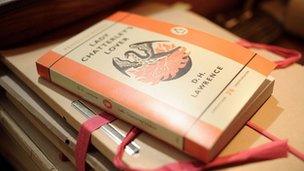Penguin and Random House owners agree joint venture
- Published

Penguin accounts for about 12% of UK book sales
Publisher Pearson says it has agreed a deal with German media group Bertelsmann to combine their Penguin and Random House businesses.
Under the terms of the deal, external, the two businesses will be run in a joint venture called Penguin Random House.
Bertelsmann will own 53% of the joint venture, while Pearson will own 47%.
The two firms said last week that they were discussing a deal. A report at the weekend also said News Corporation was planning a bid for Penguin.
The Sunday Times reported that News Corp - which owns publisher HarperCollins - was prepared to make a "substantial cash offer" for Penguin, expected to be about £1bn.
'Enhanced opportunities'
The tie-up between Penguin and Random House marks the first deal between the world's big six publishers. The others are Hachette, HarperCollins, Macmillan and Simon & Schuster. It would bring together the publishers of the Fifty Shades series and Jamie Oliver's cookbooks.
When news of the talks emerged last week, industry observers said that such deals were inevitable as firms sought to adapt to the changing publishing landscape. They are being hit hard by the proliferation of ebooks and the closure of some traditional High Street book retailers.
The rapid take-up of ebooks means publishers are trying to bolster their negotiating strength, most notably with Amazon.
Pearson chief executive Marjorie Scardino, who is leaving the firm at the end of the year, said: "Penguin is a successful, highly-respected and much-loved part of Pearson. This combination with Random House... will greatly enhance its fortunes and its opportunities.
"Together, the two publishers will be able to share a large part of their costs, to invest more for their author and reader constituencies and to be more adventurous in trying new models in this exciting, fast-moving world of digital books and digital readers."
John Makinson, chairman and chief executive of Penguin, will be chairman of the merged group, with Random House boss Markus Dohle becoming chief executive.
Based on recent results, combining the two firms will create a business with annual revenues of about £2.5bn and about one-quarter of both the UK and US book markets.
In 2011, Random House's revenues were 1.7bn euros (£1.5bn) with an operating profit of 185m euros. Meanwhile, Penguin recorded revenues of £1bn and a £111m operating profit.
London-based Penguin employs 5,500 people across the world, with almost 1,000 in the UK, and last year accounted for about 11% of the UK market. Random House has 5,300 global staff and accounted for almost 15% of the UK market last year.
Competition questions
Given the size of the combined group, the competition authorities may look closely at the tie-up, analysts said.
"In the UK the market share will be around 27%, so they may have to divest themselves of some non-core interests," said Philip Jones from the Bookseller magazine.
Theresa Wise, independent media consultant: "You don't get as much money back for an electronic copy of a book sold as you would from a physical book"
However, he said given the dominance of Amazon in digital books, such a move would be contentious.
"Amazon has 90% of the ebook market - if [the competition authorities] allowed that to happen, how can they block a merger that gives Penguin Random House 27%?"
The joint venture is subject to regulatory approval, but the two firms hope the deal will be completed in the second half of 2013.
Analysts suggest it could be the first of many deals between publishers.
"We have already seen a bit of consolidation, for example [French group] Lagardere buying [UK publishers] Orion and Octopus, but it is likely to accelerate as publishers need all the buying power they can get," said media analyst Theresa Wise.
"Amazon is so big that [at the moment] they don't have much power."
In a trading update, external, also released on Monday, Pearson said overall sales had increased by 5% in the first nine months of the year, with "good growth" at the Financial Times Group and at its International Education division.
However, operating profits were down by 5%, largely due to the sale of FTSE boosting revenue in the same period a year earlier.
- Published26 October 2012
- Published3 October 2012
- Published20 July 2012